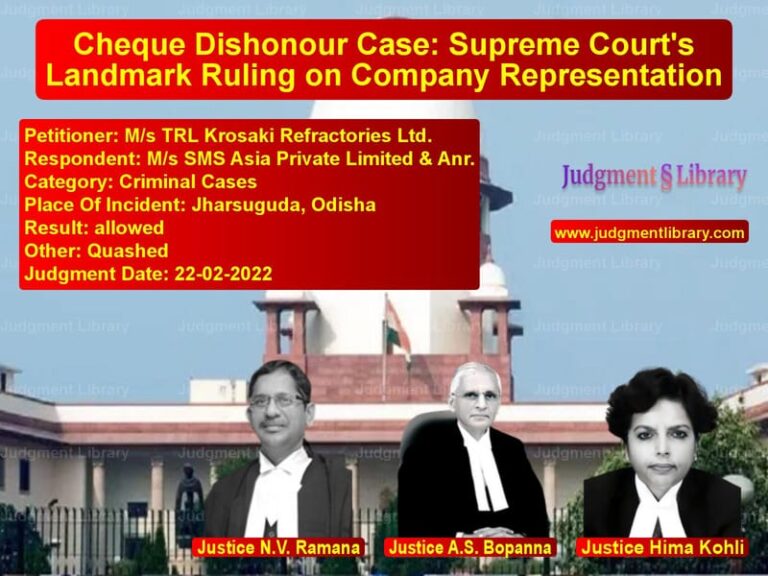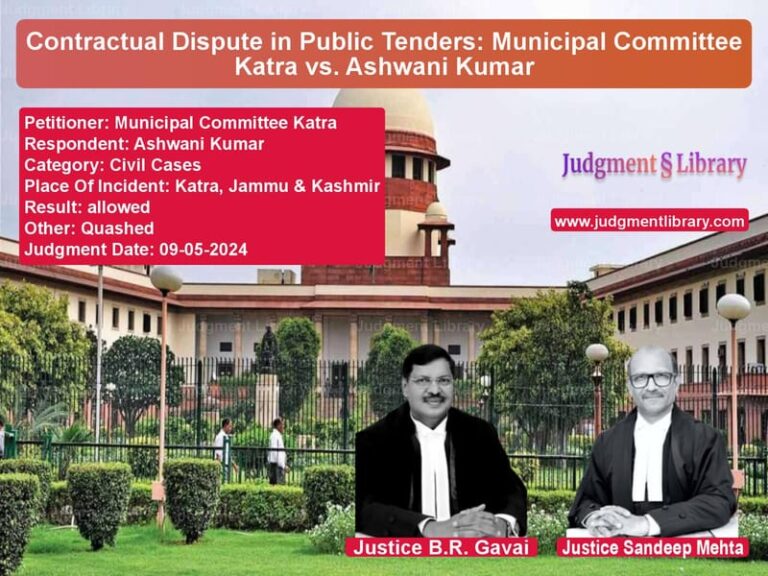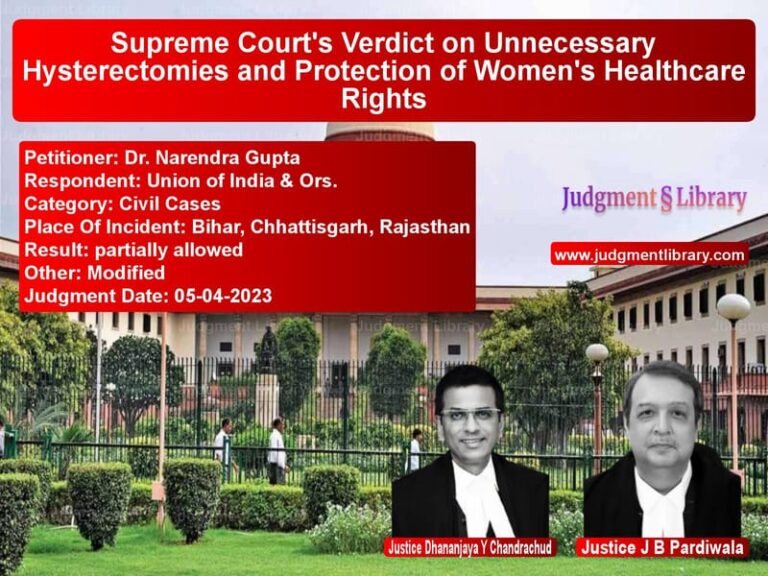Supreme Court Acquits Woman Convicted in Murder Case Due to Lack of Evidence
The case of Savitaben vs. The State of Gujarat revolves around an alleged murder where the appellant, Savitaben, was convicted of aiding her husband in setting a woman on fire. The Supreme Court acquitted Savitaben, ruling that the prosecution failed to establish her guilt beyond reasonable doubt, particularly due to inconsistencies in witness statements and the absence of her name in the earliest dying declaration of the deceased.
Background of the Case
The prosecution alleged that on June 4, 2005, a dispute arose between the deceased, Narmadaben, and the accused due to a misunderstanding. According to the prosecution’s version, an argument ensued between Narmadaben and accused No.1, Manaharbhai Ambalal Rohit (husband of Savitaben), which escalated into violence.
During the altercation, the prosecution claimed that Manaharbhai chased Narmadaben into her house, caught hold of her, and called upon his wife, Savitaben, to bring kerosene. It was alleged that Savitaben provided the kerosene, which was then poured over the deceased by Manaharbhai, who set her ablaze with a matchstick. The accused then fled the scene.
The incident was witnessed by Bharat (PW-12), son of the deceased, who informed his father, Bhikhabhai Mithabhai Rohit (PW-4). Neighbors, including Rajesh Kumar Makwana (PW-15) and Gunvantsinh Makwana (PW-16), helped cover the burning victim with a mattress and took her to the hospital.
Trial Court and High Court Decisions
Based on the prosecution’s evidence, the Sessions Court convicted both Manaharbhai and Savitaben under:
- Section 302 IPC read with Section 114 IPC (abetment of murder) – Life imprisonment.
- Section 452 IPC (house trespass with intent to harm) – Two years of rigorous imprisonment.
The Gujarat High Court upheld the conviction and sentence, leading to the appeal before the Supreme Court.
Legal Issues Before the Supreme Court
The key legal questions were:
- Whether the prosecution had proven beyond a reasonable doubt that Savitaben participated in the crime.
- Whether the dying declarations of the deceased could be relied upon to convict Savitaben.
- Whether inconsistencies in witness testimonies affected the credibility of the prosecution’s case.
Arguments by the Petitioner (Savitaben)
- She contended that her conviction was based solely on the testimony of Bharat (PW-12), who was an interested witness.
- The earliest dying declaration recorded by Dr. Chandrakant (PW-3) only mentioned Manaharbhai as the perpetrator and did not implicate her.
- The prosecution failed to produce any independent witnesses to corroborate Bharat’s claim.
- The long-standing enmity between the families led to false implications.
Arguments by the Respondent (State of Gujarat)
- The prosecution argued that Bharat (PW-12) had clearly stated that Savitaben brought the kerosene, thus aiding in the murder.
- The High Court had correctly upheld the conviction, as the evidence was consistent with the chain of events.
- The prosecution witnesses corroborated the incident, proving that Savitaben played an active role.
Supreme Court’s Analysis and Judgment
The Supreme Court critically examined the evidence and found several inconsistencies in the prosecution’s case. The Court made the following key observations:
- “The dying declaration recorded by Dr. Chandrakant (PW-3) was the earliest and most credible account of the incident. In that statement, the deceased named only Manaharbhai and did not mention Savitaben’s role in the crime.”
- “The prosecution failed to explain why the second dying declaration, which implicated Savitaben, surfaced only later.”
- “The failure to examine Mehul, the other son of the deceased who was present at the time of the incident, raises doubts about the prosecution’s version of events.”
- “There was a six-hour delay in filing the FIR, which raises concerns about possible manipulation of evidence.”
Acquittal of Savitaben
Considering the inconsistencies in the prosecution’s case, the Supreme Court ruled:
- The conviction of Manaharbhai under Section 302 IPC was upheld.
- The conviction of Savitaben was set aside due to a lack of evidence proving her direct involvement.
- She was acquitted of all charges and ordered to be released immediately.
Significance of the Judgment
This ruling establishes key legal principles:
1. Importance of Early Dying Declarations
- The Court ruled that the first dying declaration recorded by medical personnel is often the most reliable.
- Subsequent declarations must be corroborated by independent evidence.
2. Role of Independent Witnesses
- Convictions should not be based solely on testimonies from interested witnesses.
- The failure to examine key witnesses weakens the prosecution’s case.
3. Benefit of Doubt to the Accused
- If the prosecution fails to establish the guilt of an accused beyond a reasonable doubt, courts must acquit them.
- False implications due to personal enmity must be examined carefully.
Conclusion
The Supreme Court’s decision in Savitaben vs. The State of Gujarat upholds the principle that criminal liability must be proven beyond reasonable doubt. The acquittal of Savitaben reinforces the importance of reliable dying declarations and the need for independent evidence in criminal trials.
Petitioner Name: Savitaben.Respondent Name: The State of Gujarat.Judgment By: Justice R. Banumathi, Justice R. Subhash Reddy.Place Of Incident: Ahmedabad, Gujarat.Judgment Date: 11-03-2019.
Don’t miss out on the full details! Download the complete judgment in PDF format below and gain valuable insights instantly!
Download Judgment: Savitaben vs The State of Gujarat Supreme Court of India Judgment Dated 11-03-2019.pdf
Direct Downlaod Judgment: Direct downlaod this Judgment
See all petitions in Murder Cases
See all petitions in Attempt to Murder Cases
See all petitions in Custodial Deaths and Police Misconduct
See all petitions in Judgment by R. Banumathi
See all petitions in Judgment by R. Subhash Reddy
See all petitions in allowed
See all petitions in supreme court of India judgments March 2019
See all petitions in 2019 judgments
See all posts in Criminal Cases Category
See all allowed petitions in Criminal Cases Category
See all Dismissed petitions in Criminal Cases Category
See all partially allowed petitions in Criminal Cases Category







